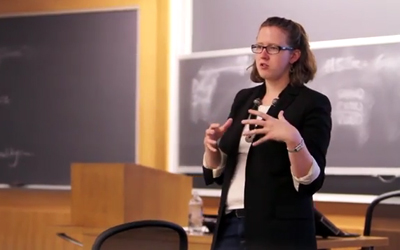Justice Anthony Kennedy References Argument in Professor Abigail Moncrieff’s King v. Burwell Amicus Brief
Moncrieff makes a constitutional argument in favor of upholding federal subsidies outlined in the under the Court’s anti-coercion doctrine.

Update: On March 4, the Supreme Court heard oral arguments in the Obamacare case, King v. Burwell. Over the course of the 90 minutes allotted to the case, Justice Anthony Kennedy referenced the constitutional argument developed in an amicus brief written by BU Law Professor Abigail Moncrieff.
Three of the 31 amicus briefs submitted in the King v. Burwell case made constitutional arguments in favor of maintaining the subsidies. One brief was filed by 22 states; another by five law professors; and the final brief was written by Professor Moncrieff and the Jewish Alliance for Law & Social Action (JALSA). The first two briefs make Constitutional avoidance arguments that have to do with the clarity with which Congress must act in order to affect states in particular ways or change the relationship between federal and state governments. Moncrieff goes into each argument in more detail in a March 6 blog post.
Each of the briefs was discussed in oral arguments, although not by name. However, Justice Kennedy directly referenced an argument and hypothetical scenario unique to the JASLA brief. The brief argues that the plaintiff’s interpretation amounts to regulatory coercion, i.e., under the petitioners’ interpretation, Obamacare says to the states: “Establish an exchange, or the federal government will enforce within your borders a subset of regulations that’s purposefully designed to destroy health insurance markets in your state.”
As Moncrieff related in her blog post:
When Justices Sotomayor, Kennedy, and Ginsburg were first pushing plaintiffs’ attorney Michael Carvin on the constitutionality of his interpretation, Carvin’s initial response was that, if plaintiffs’ interpretation is unconstitutional, then all of the many fiscal threats in existing cooperative federalism schemes are also unconstitutional.
But Justice Ginsburg jumped in immediately, saying, “But this is quite different,” and Justice Kennedy followed up right after that with a hypothetical lifted straight from pages 27-28 of the JALSA brief: “In South [Dakota] v. Dole, where the matter of funding for the highway, suppose Congress said, and if you don’t build the highways, you would have to go 35 miles an hour all over the State.” That’s the hypothetical case that I used to sharpen the distinction between fiscal and regulatory threats and to pose the difficulties that would arise in assessing the constitutionality of such regulatory threats. Justice Kennedy continued, “We wouldn’t allow that.”
Justice Kennedy’s line of questioning may have an important impact on the way the Court rules. If he sides with more liberal Justices his vote could be the one that upholds the subsidies for all states on federal exchanges. The one qualifier, Moncrieff notes, is that Kennedy must first agree that the statute is unclear before he can use the avoidance argument. If, upon closer inspection, he agrees with the plaintiffs and finds the statute is clear enough as it is written, the Justices will have to deal with the constitutional questions as they come through the courts.
Read more about the arguments in Professor Moncrieff’s brief below.
![]()
Boston University School of Law Associate Professor Abigail Moncrieff has written an amicus brief in support of the government’s interpretation of the Affordable Care Act (ACA) in a case set to be argued before the United States Supreme Court on March 4.
King v. Burwell is one of four identical cases making their way through the court system. The challenge arises from an ambiguously worded provision of the ACA, which calculates the amount of subsidy that an individual can receive by reference to the cost of insurance on a health insurance exchange “established by the state.”
The petitioners, David King, et al., argue that the statute contains the language “by the state” so that only state-run exchanges—not the federally-run exchanges operating through HealthCare.gov—will be allowed to distribute subsidies to individuals purchasing insurance. Since 34 states declined to set up their own exchanges, if the Court adopts the petitioners’ interpretation of this statutory provision, millions of people would be cut off from the financial assistance that largely underpins the Affordable Care Act.
Moncrieff’s brief argues the petitioner’s interpretation of the statute would render the statute unconstitutional under two principles of federalism: that Congress can’t coerce states into implementing federal programs, and that all states must be treated equally.
“My scholarship focuses on the intersection of health law and constitutional law, particularly on federalism and the separation of powers,” Professor Moncrieff says. “So this debate is at the core of my work.”
Inspiration from the Classroom
The inspiration for the brief’s argument came from former student Joel Dodge (‘14), now a litigator with Stroock & Stroock & Lavan in New York City. He developed the argument in Moncrieff’s Health Care Reform and the Constitution class. “Professor Moncrieff had us study the case when it was in the lower courts,” he says. “As we discussed the idea more, we couldn’t believe no one else was making this argument.”
“The more I thought about Joel’s point, the more I wanted to flesh it out,” says Moncrieff. “So when the Jewish Alliance for Law and Social Action (JALSA) approached me to see if I was interested in developing and filing a brief for this case, I immediately contacted Joel to get the ball rolling.”
Moncrieff had worked with JALSA in 2011 when she and students in her class on Constitutional Health Care Litigation (co-taught with co-director of the BU Law Health Law Program Kevin Outterson) filed a brief for the first ACA Supreme Court Case. In addition to Dodge, she credits a number of health law professors from various law schools across the country for their invaluable help in shaping the argument and editing the brief.
“When Professor Moncrieff asked me to help with the brief, I jumped at the opportunity,” Dodge notes. “I conducted research, suggested ideas to strengthen the argument, and revised drafts. It has been a tremendous experience to get to work on a brief for such an important case so early in my legal career, and it really all started in a BU Law classroom.”
Making the Case
The brief makes two points: first, that the subsidies-as-incentives violate the Court’s anti-coercion doctrine. The idea is that if the subsidies were put in place as an incentive for states to establish health insurance exchanges, then, by limiting those subsidies, Congress could coerce states into implementing federal policy that they didn’t agree with.
However, in a 2012 Supreme Court ruling, National Federation of Independent Business (NFIB) v. Sebelius, the Court held that the federal government could not require states to participate in federal programs by threatening to withhold federal money. “The petitioners’ interpretation, if accepted by the Court, would trigger the anti-coercion doctrine set up inNFIB,” Moncrieff says, “and so make the ACA unconstitutionally coercive.”
The second part of the argument holds that if the subsidies are limited to state-run exchanges, then the federal government will begin treating states differently in the substantive law, not just in the amount of funding provided. The subsidies are necessary under the statute to trigger enforcement of the individual and employer mandates, so if subsidies are unavailable in some states, then the federal government will be enforcing the mandates in some states but not others. This creates a violation of the constitutional principle of equal sovereignty. Moncrieff cites Shelby County v. Holder, the 2013 ruling that invalidated provisions of the Voting Rights Act of 1965, as precedent for the requirement that the federal government treat all states equally.
Implications
Beyond the constitutional arguments against King et al.’s interpretation of the statute, Moncrieff notes the real-world consequences would lead to the collapse of the individual insurance market.
“Under the ACA, the individual and employer mandates to buy insurance are only enforceable if the subsidies are in place to make health care plans more affordable,” Moncrieff says. “This creates a much larger problem, in that the petitioners’ interpretation would functionally nullify the individual and employer mandates in any state that does not set up its own exchange.”
This creates a situation in which the mandates are unenforceable, but insurance markets are still bound by the rest of the ACA’s regulations, like guaranteed issue (which requires insurance companies to sell a policy to anyone who wants to buy one) and community rating (which requires the price of a policy to be the same for everyone who buys it).
“Without the mandates, these market reforms create a strong incentive for people to wait until they are sick to purchase insurance,” Moncrieff notes. “Insurance companies will anticipate this, and since individual policies only make up a small percentage of the insurance market, many economists predict that insurance companies will simply stop selling individual plans.”
The strength of Moncrieff’s constitutional argument is that the Court usually will choose to interpret statutes to avoid constitutional problems.
“Many, if not all, of the conservative justices on the Court believe that it’s not the Supreme Court’s job to ‘fix’ what Congress wrote, no matter how impractical it may seem,” Moncrieff says. “But several of the conservative justices believe that the Court does have an obligation to avoid constitutional difficulties, which makes this a very strong argument in favor of keeping the ACA subsidies.”
